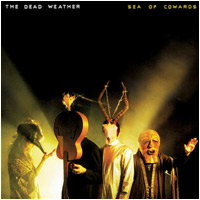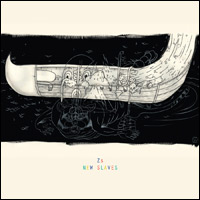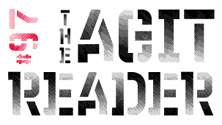
Sea of Cowards
Third Man/Warner Bros.
Coming less than a year after the band’s debut, the Dead Weather’s second album, Sea of Cowards, may seem like more of the same to the naked ear. But repeated listens reveal the proverbial supergroup—the Kills’ Alison Mosshart, the Raconteurs’ Jack Lawrence, Queens of the Stone Age’s Dean Fertita, and of course, Jack White (of the White Stripes, duh)—laying it on thicker this time around. And by “it” I mean not only the gritty garage-dusted blues that all the involved parties have made their stock-in-trade, but Zeppelin-sized riffs, in-the-red saturation, and a locker full of fuzz. In other words, more of more.
The approach comes off somewhat rote on the lead-off “Blue Blood Blues,” but even here there are soulful touches. Better is “Hustle and Cuss,” which is rooted in a Stax-ian groove and which flits between a thick miasma of guitar and keys to just its foundation of backbeat and bass. “The Difference Between” adapts a more modern visage, but its mix of synth squelching, hard beats, static-age guitar licks and Mosshart’s tough-as-nails howl give it an edge not found elsewhere. The creeping funk found on “Old Mary” is more jarring than groovy, with White’s Biblical monologues sounding more medicine show revival than reverential. This is a record of contrasting extremes running hot and cold (but mostly hot) to find a potent middle ground.
Stephen Slaybaugh

Nothing Hurts
Sub Pop
Male Bonding is a band of formulas. and Nothing Hurts is an album that takes some effort to clearly deal with the math involved. Not mathematics in their songs’ compositional anatomy—though towards the end, the addition of Polo-esque angularities tend to ruin the fun—but calculations on how a trio from Dalston, England has come to a ramshackle sound that draws directly from a double-decade of indie rock recycling. Perhaps you could blame it on No Age, for a feeling more than a sound though. Thankfully that feeling is fleeting (rarely do Male Bonding make it past the two-minute mark) and is full of ephemeral pop hooks that tend to drift in and out of the band’s artistically structured bombast. Theirs are like the golden brown melodies that were secondary to volume and space for SST bedrock groups like the Meat Puppets, Hüsker Dü, and Dinosaur, only wrung through the years and trends that followed (shimmering Britpop and shoegaze, slack-jawed rec-room preciousness, and the first revival of lo-fi). You could even portend that Nothing Hurts is sort of aesthetically forcing a second wave by making their racket sound sonically nurtured for maximum crossover potential.
Nothing Hurts really is a beautiful mess, as the band can obscure any lack of harmony or dexterity with speed and blunt riffs. “Year’s Not Long” and “All Things This Way” appear as arena anthems in the initial blast of energies and precision. There’s truly nothing “Dalston” about Male Bonding; if you were listening from afar you might swear that “Weird Feelings” was the epitome of American rock radio, like the Foo Fighters played by Ride or Teenage Fanclub in their prime. It’s a lot of trickery actually. We’re to imagine their cave scrawls turning to dreamy romantic mist-pop on “Franklin,” one slight of hand that works. But we’re also to suppose “Paradise Vendors” can cram Bleach-era grunge into the same astral-punk blitzkrieg that worked so well on the record’s first half. This last hooray, which tries too hard to portray Nothing Hurts as something bigger than it really is, relies on a lot of strangled notes that don’t fit the preceding romp. All experimenting aside, the somber finale, “Worst to Come,” aided by a familiar Vivian Girls coo, reveals there may just be a soul after all.
Kevin J. Elliott
MP3: “Franklin”

New Slaves
The Social Registry
I first stumbled upon Zs when a friend showed me a YouTube clip of four young men, who carried themselves with a seriousness usually reserved for concert pianists, on a cramped Brooklyn stage playing some of the most abrasive noise rock I’d ever heard from sheet music. At first, I thought it was a joke; the music was so volatile and scattershot that I imagined the sheet music to be useless, if not downright counter-productive. But as I continued to listen, I realized that the band possessed a sense of tightness and precision that belied the fluid song structures, noisy outbursts, and primal percussion. Zs’ music may sound like a formless mess at times, but it can all turn on a dime at any given moment.
Their latest album, New Slaves, is a sprawling, 70-minute double album that tests one’s patience and eardrums, while ultimately rewarding devoted listeners who pass through its gauntlet. Little surprises abound like the “flight of the bumblebee” strings that form out of the ether on “Concert Black.” On “Masonry,” a childlike xylophone is an ever so brief reprieve from the manic dread dominating the rest of the record. And on the title track, the band handles the pre-meditated 20-minute deconstruction of a hypnotic opening riff with the unsettling focus and determination of a psychopath.
The biggest thing I’ve taken from New Slaves is that I desperately want to see these guys live. Something just doesn’t feel right about listening to Zs try to soundtrack the apocalypse from an easy chair with a nice cup of coffee at my side. Though the album’s certainly not for everybody, New Slaves should appeal to both noise-heads who don’t mind a bit of theory with their cacophony, and classical music enthusiasts who don’t mind getting their hands dirty.
David Holmes
MP3: “Acres of Skin”

Possession of Sound
Post Present Medium
Like its predecessor, last year’s Dim Light, Possession Sound occupies a very specific niche. Festered with dozens of little pop moments, it is nonetheless composed of such stark motifs, it is sometimes hard to see these sparks amongst the partly cloudy background. When Caroline Keith sings, “I want to see more light,” on “Phaedra,” you get the sense that she means it.
Like, say, Felt or the Silver Jews early on, Gun Outfit works with subtlety and the barebones of necessity. Keith and Dylan Sharp trade guitar and lyrical lines almost quid pro quo, never crowding any of the record’s dozen songs unnecessarily. “Washed Up” is the best example, a mildly saddened combing of ringing notes, lightly tapped drums and unadorned vocals. It and the following “Southern Chill” give off an air of decline in their seeming relinquishing of ebullience for the elegiac. “The Lack,” as its title implies, is as much about what isn’t there as what is, Sharp’s dry aphorisms more poignant for the possible indifference. Possession Sound doesn’t seek to be more than what it is, and that is plenty.
Stephen Slaybaugh

Ready to Howl
TestosterTunes
The mission of most power blues trios—both new and old—is usually to appear as monolithic as allowed. At least the good ones know that the membrane separating the nexus of hardcore British bluesmen, Southern rock grits, and the proto-metal scumbags is quite thin. These days a band has to breathe life into all of the above to go above and beyond what’s expected from just riding on a jam. There is, however, a difference between jamming and shredding, and Philadelphia’s Birds of Maya settle into the latter as if they are digging for the Earth’s molten core. It honestly doesn’t get more monolithic than the band’s sophomore album, the three-sided behemoth Ready to Howl. With no song titles, the album is split into Friday, Saturday, and Sunday—a dunderheaded concept that remarkably works to the advantage of this ultimate party record. The boogie they lay down becomes endless before abruptly stopping, causing the listener to change sides to continue into Saturday morning. Instantly the druggy hypnotic clockwork of Hawkwind comes to mind.
Birds of Maya are built for a monstrous endurance funneled into the fidelity of one microphone hanging from the basement rafters. If we are to suppose that “Friday” lasts until early “Saturday” evening, that equates to a solid 30 minutes of destroyer riff, never once losing pace or descending into wank-laden downtime. Their sonics are a tool; while they constantly flip through doom-encrusted Sabbath standards and slippery Groundhog slides, the distortion creates an extra layer of illusionary labyrinths. Sunday is the ultimate come-down, aligning the trio with other smarter stoner miasmas while going at it half-pace, cranking up the gain, and doing a spiritual shuffle.
Kevin J. Elliott
ALBUM REVIEWS
The New Pornographers, Together
Minus the Bear, Omni
Batusis, Batusis EP
Flying Lotus, Cosmogramma
Snowglobe, Little More Lived In
BoB, The Adventures of Bobby Ray
Doves, The Places Between
White Fence, White Fence
StreetLab, Auto Spkr
Wounded Lion, Wounded Lion
Plants and Animals, La La Land
Sam Amidon, I See the Sign
Bustin' Loose
Horse Feathers, Thistled Spring
